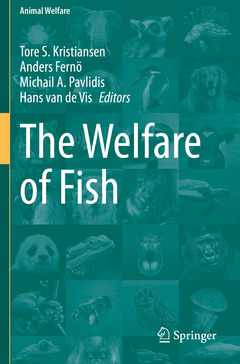The Welfare of Fish, 1st ed. 2020 Animal Welfare Series, Vol. 20
Coordonnateurs : Kristiansen Tore S., Fernö Anders, Pavlidis Michail A., van de Vis Hans

This book investigates how fish experience their lives, their amazing senses and abilities, and how human actions impact their quality of life. The authors examine the concept of fish welfare and the scientific knowledge behind the inclusion of fish within the moral circle, and how this knowledge can change the way we treat fish in the future. In many countries fish are already protected by animal welfare legislation in the same way as mammals, but in practice there is still a major gap between how we ethically view these groups and how we actually treat them. The poor treatment of fish represents a massive animal welfare problem in aquaculture and fisheries, both in terms of the number of animals affected and the severity of the welfare issues.
Thanks to its interdisciplinary scope, this thought-provoking book appeals to professionals, academics and students in the fields of animal welfare, cognition and physiology, as well as fisheries and aquaculture management.
Tore S. Kristiansen is an experienced leader at the Animal Welfare research group, Institute of Marine Research (IMR) in Bergen, Norway, and also heads the Norwegian National Committee for the Protection of Animals Used for Scientific Purposes. He completed his Master’s and PhD in Fisheries Biology at the University of Bergen, Norway and subsequently became a researcher at the IMR, where he has focused on fish welfare research ever since. Having served as a project leader and coordinator of several national and European research projects concerning fish welfare, his expertise covers a broad range of areas, including population dynamics, stock enhancement, and juvenile production of Atlantic cod and lobster; behavior, cognition and learning ability of cod, halibut, and salmon; stress- and neurobiology, and the welfare of farmed fish.
Anders Fernö is a Professor Emeritus at the Department of Biological Sciences at the University of Bergen, Norway. He started his academic studies at the University of Lund, Sweden and completed his PhD at the University of Stockholm, Sweden. He became an Assistant Professor and later Professor at the University of Bergen and was also Adjunct Chief Scientist at the Institute of Marine Research in Bergen. His research focuses on the behavior of marine and freshwater fish. His expertise covers a broad field including ontogeny and learning, spatio-temporal dynamics and schooling dynamics, with applications in the distribution of commercial fish species, fish capture, aquaculture, sea ranching, and welfare. Fernö has been member of the editorial board of Applied Animal Behaviour Science.
Michalis A. Pavlidis is a Professor at the Department of Biology, University of Crete, Greece. He received his M.Sc in Public Health from the School of Public Health and Hygiene, Athens and his PhD in Biology from the University of Athens, Greece. His fields of specialization inclu
Offers vital insights into the life of fishes and their amazing abilities
Introduces readers to the knowledge base for including fish within the moral circle
The first book to address the welfare of wild, farmed and ornamental fishes
Date de parution : 07-2021
Ouvrage de 515 p.
15.5x23.5 cm
Date de parution : 07-2020
Ouvrage de 515 p.
15.5x23.5 cm
Thèmes de The Welfare of Fish :
Mots-clés :
welfare assessment and welfare indicators; aquaculture; fisheries; pain; allostasis; stress; fish welfare; senses; cognition; behavior



